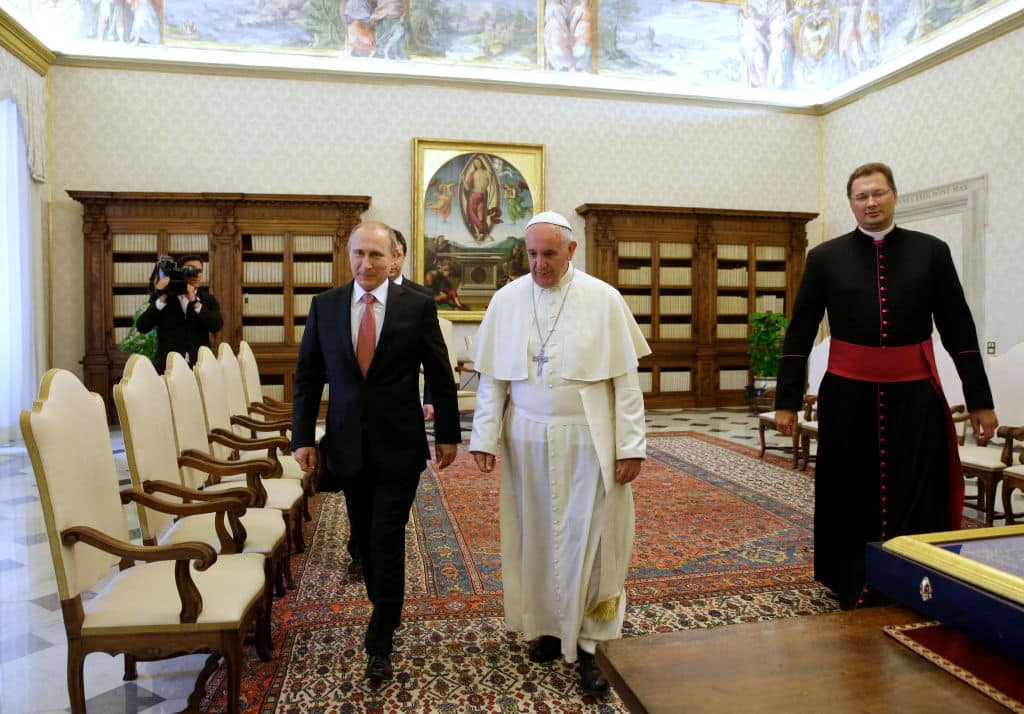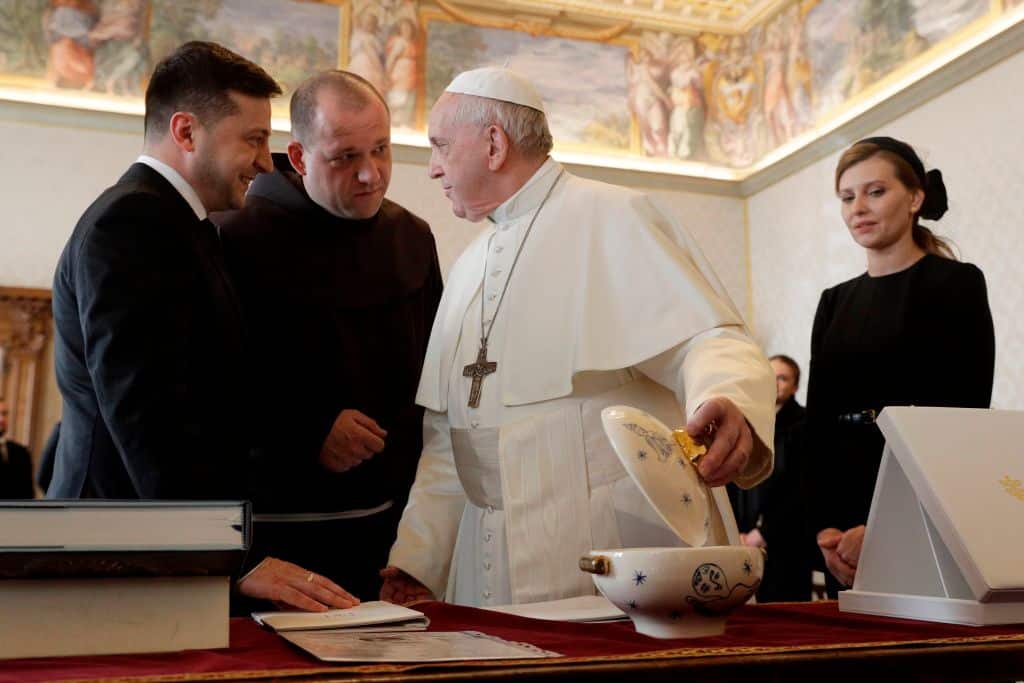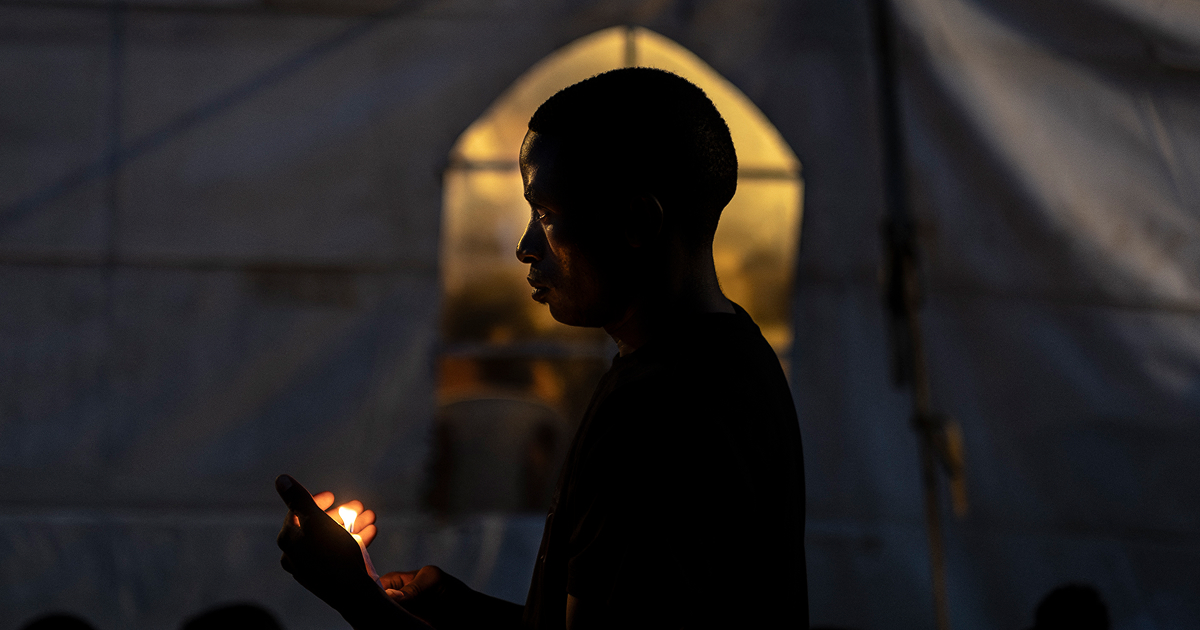Long ago, one cold February evening in Oxford, I made the short journey to St Aldate’s Church to hear a panel, including the then Bishop of Oxford, Richard Harries, discuss the impending invasion of Iraq. The bishop, a patrician liberal Anglican of the old school, was firmly opposed. In those days I was a zealous neocon, keen for the English-speaking nations and their allies to export freedom and democracy at the barrel of a gun, so I went along spoiling for an argument. I even managed to ask a question (rather a clever one, I thought at the time) about why we should set any store by the moral authority of the UN Security Council.
I remember being very cross with one particular point that Harries made; that an imperfect peace was often preferable to war. To my nineteen-year-old self this seemed defeatist and weak: a counsel of despair and an excuse for complacent inaction. In other debates about the war, I insisted furiously that peace without justice was not really peace at all. In my school history lessons, the failure of the free world to confront totalitarian aggression in the 1930s, and the final defeat of Communism through Anglo-American resolve, had featured heavily.
More than two decades on from that night, my views have changed somewhat. The war in Iraq turned out, as the peaceniks predicted, to be a total disaster for millions upon millions of people, not least for the country’s Christians. Even the “good” post-9/11 war (the occupation of Afghanistan) turned sour, as we learned the hard way about the limitations of modern liberal imperialism.
As I get older, I am strongly affected by the sheer misery of war for ordinary people – even necessary and justifiable war. When you’re young, you identify with the soldiers; you share the excitement and adrenaline of fighting. Then, you have a family and you can see yourself not as the soldier, but as the refugee struggling to feed your children, or the parent fearing the worst as they wait for news from the front.
I often think in this context of my paternal grandfather, who fought in Normandy in the Second World War, and was a witness to the devastating Allied bombardment of Caen, which more or less destroyed the city and may have killed thousands of civilians. The liberation of France was a noble cause, but a terrible thing all the same.
All of which is to say that I understand a lot better than I once did why Our Lord taught that “Blessed are the peacemakers", and also why it can be so difficult to work for peace. We see this today with the war in Ukraine, which has developed into a grim attritional stalemate. There have been tens of thousands of deaths, and hundreds of thousands of casualties. Much of the war zone in the east of Ukraine has been devastated, and Ukrainian cities have been heavily damaged by Russian bombing.
However, in most public discussions, those who publicly advocate a negotiated settlement – the peacemakers – are very often written off as pro-Putin dupes or apologists for Russian revanchism. Discourse about the conflict remains heavily moralistic, with those in favour of a realistic solution that gives both sides some of what they want accused of rewarding bad behaviour.
If you point out that Kyiv’s stated war aim of removing all Russian forces from Ukraine’s pre-2014 borders is unachievable without a level of escalation from NATO that would almost certainly trigger a wider war with Russia, you are liable to be regarded as little better than a Kremlin stooge.
I don’t claim to be any kind of expert in these matters – I am not nearly so confident in my own opinions as I was twenty years ago – nor do I have any brilliant answers. But as a general observation, there will at some point have to be a peace agreement. It is very likely that such an agreement will not represent a good outcome, in the sense of restoring to Ukraine the borders agreed after its independence from the Soviet Union thirty years ago. But it might very well be the best available outcome given the alternatives. The fact is that Lord Harries of Pentregarth (as he now is) was right, and my 2003-vintage self was wrong. Sometimes an unjust peace is, after all, better than an endless bloody war.
The Holy Father has been criticised several times for his attempts to promote a settlement in Ukraine. The constant theme of this criticism is that, by saying it is time to stop fighting, he is siding with the aggressor.
But this is an uncharitable reading of his point. What Pope Francis realises is that in the political choices of this fallen world, sometimes the quest for perfection, for the most morally satisfactory solution, can lead to a great deal of unnecessary suffering. Wars tend to develop their own awful momentum, quite separate from the issues actually at stake, and we need someone like the Pope to remind the world of that fact.
RELATED: Critics who paint the Pope as a ‘meek’ peacenik over Ukraine fail to see how victory can lie in unexpected places
This article appears in the October 2024 edition of the Catholic Herald. To subscribe to our award-winning, thought-provoking magazine and have independent, high-calibre, counter-cultural and orthodox Catholic journalism delivered to your door anywhere in the world click HERE.
Long ago, one cold February evening in Oxford, I made the short journey to St Aldate’s Church to hear a panel, including the then Bishop of Oxford, Richard Harries, discuss the impending invasion of Iraq. The bishop, a patrician liberal Anglican of the old school, was firmly opposed. In those days I was a zealous neocon, keen for the English-speaking nations and their allies to export freedom and democracy at the barrel of a gun, so I went along spoiling for an argument. I even managed to ask a question (rather a clever one, I thought at the time) about why we should set any store by the moral authority of the UN Security Council.
I remember being very cross with one particular point that Harries made; that an imperfect peace was often preferable to war. To my nineteen-year-old self this seemed defeatist and weak: a counsel of despair and an excuse for complacent inaction. In other debates about the war, I insisted furiously that peace without justice was not really peace at all. In my school history lessons, the failure of the free world to confront totalitarian aggression in the 1930s, and the final defeat of Communism through Anglo-American resolve, had featured heavily.
More than two decades on from that night, my views have changed somewhat. The war in Iraq turned out, as the peaceniks predicted, to be a total disaster for millions upon millions of people, not least for the country’s Christians. Even the “good” post-9/11 war (the occupation of Afghanistan) turned sour, as we learned the hard way about the limitations of modern liberal imperialism.
As I get older, I am strongly affected by the sheer misery of war for ordinary people – even necessary and justifiable war. When you’re young, you identify with the soldiers; you share the excitement and adrenaline of fighting. Then, you have a family and you can see yourself not as the soldier, but as the refugee struggling to feed your children, or the parent fearing the worst as they wait for news from the front.
I often think in this context of my paternal grandfather, who fought in Normandy in the Second World War, and was a witness to the devastating Allied bombardment of Caen, which more or less destroyed the city and may have killed thousands of civilians. The liberation of France was a noble cause, but a terrible thing all the same.
All of which is to say that I understand a lot better than I once did why Our Lord taught that “Blessed are the peacemakers", and also why it can be so difficult to work for peace. We see this today with the war in Ukraine, which has developed into a grim attritional stalemate. There have been tens of thousands of deaths, and hundreds of thousands of casualties. Much of the war zone in the east of Ukraine has been devastated, and Ukrainian cities have been heavily damaged by Russian bombing.
However, in most public discussions, those who publicly advocate a negotiated settlement – the peacemakers – are very often written off as pro-Putin dupes or apologists for Russian revanchism. Discourse about the conflict remains heavily moralistic, with those in favour of a realistic solution that gives both sides some of what they want accused of rewarding bad behaviour.
If you point out that Kyiv’s stated war aim of removing all Russian forces from Ukraine’s pre-2014 borders is unachievable without a level of escalation from NATO that would almost certainly trigger a wider war with Russia, you are liable to be regarded as little better than a Kremlin stooge.
I don’t claim to be any kind of expert in these matters – I am not nearly so confident in my own opinions as I was twenty years ago – nor do I have any brilliant answers. But as a general observation, there will at some point have to be a peace agreement. It is very likely that such an agreement will not represent a good outcome, in the sense of restoring to Ukraine the borders agreed after its independence from the Soviet Union thirty years ago. But it might very well be the best available outcome given the alternatives. The fact is that Lord Harries of Pentregarth (as he now is) was right, and my 2003-vintage self was wrong. Sometimes an unjust peace is, after all, better than an endless bloody war.
The Holy Father has been criticised several times for his attempts to promote a settlement in Ukraine. The constant theme of this criticism is that, by saying it is time to stop fighting, he is siding with the aggressor.
But this is an uncharitable reading of his point. What Pope Francis realises is that in the political choices of this fallen world, sometimes the quest for perfection, for the most morally satisfactory solution, can lead to a great deal of unnecessary suffering. Wars tend to develop their own awful momentum, quite separate from the issues actually at stake, and we need someone like the Pope to remind the world of that fact. <br><br><a href="https://catholicherald.co.uk/critics-of-the-pope-as-a-meek-white-flag-waving-peacenik-miss-how-victory-can-lie-in-unexpected-places/?swcfpc=1"><mark style="background-color:rgba(0, 0, 0, 0)" class="has-inline-color has-vivid-cyan-blue-color"><strong><em>RELATED: Critics who paint the Pope as a ‘meek’ peacenik over Ukraine fail to see how victory can lie in unexpected places</em></strong></mark></a>
<strong><strong>This article appears in the October 2024 edition of the <em>Catholic Herald</em>. To subscribe to our award-winning, thought-provoking magazine and have independent, high-calibre, counter-cultural and orthodox Catholic journalism delivered to your door anywhere in the world click <a href="https://catholicherald.co.uk/subscribe/?swcfpc=1"><mark style="background-color:rgba(0, 0, 0, 0)" class="has-inline-color has-vivid-cyan-blue-color">HERE</mark></a></strong></strong>.


















